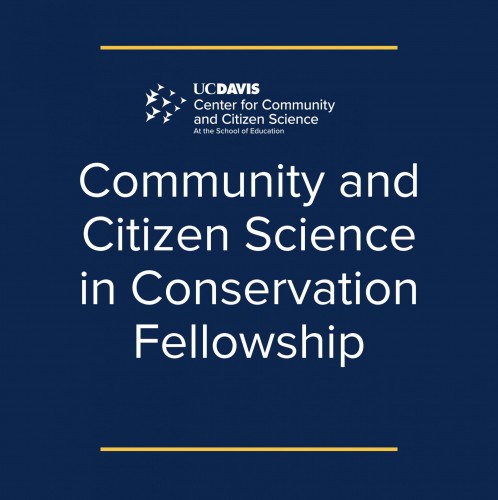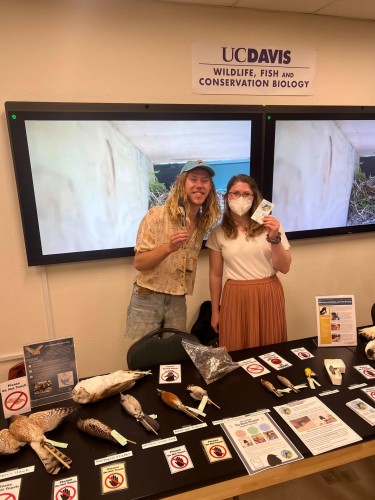CCS About Us
About Us
The Center for Community and Citizen Science at the UC Davis School of Education is focused on the promise and potential of science outside of typical academic and professional silos. Our mission—to help scientists, communities, and other members of the public collaborate on science to address environmental problems as a part of civic life—recognizes the inspiring possibilities that emerge when we dismantle assumptions about who can (and can’t) do real science, and think creatively about what collaboration can look like.
2024 Impact Report 2024 available online
Sharing over a decade of the Center's innovative CCS research and programming
 The Center for Community and
Citizen Science is thrilled to announce the release of our
2024 Impact Report, a comprehensive look at the strides made over
the past decade toward achieving our mission. This report is both
a reflection of our efforts and accomplishments, and a testament
to the collective power of our community, partners, and
supporters.
The Center for Community and
Citizen Science is thrilled to announce the release of our
2024 Impact Report, a comprehensive look at the strides made over
the past decade toward achieving our mission. This report is both
a reflection of our efforts and accomplishments, and a testament
to the collective power of our community, partners, and
supporters.
Our Specific Commitments to Anti-Racism
July 2020
In early June, 2020, the Center for Community and Citizen Science acknowledged that while some of our ongoing work is explicitly oriented toward equity and social justice, we have also failed to advance equity and justice through the entirety of our work, particularly in the context of academia, which is inextricably linked to historical and ongoing marginalization of BIPOC. We have an obligation to examine our own work, our own everyday actions, and our institutional context, and identify ways that these perpetuate racism.
Working Toward Racial Justice
June 11, 2020
We at the Center for Community and Citizen Science are horrified and saddened by the most recent iterations of anti-Blackness and systemic racism in our society, our communities, and our institutions. While the events of recent weeks have laid bare their consequences, these systems have always existed in the United States. The murders of George Floyd, Nina Pop, Tony McDade, Breonna Taylor, and Ahmaud Arbery are only recent examples, among countless others, of Black people suffering under a centuries-old system of white supremacy.
Our People
The Center for Community and Citizen Science is a team of faculty, staff, graduate students, postdoctoral scholars, and undergraduate interns who collaborate with partners from local, state, and federal agencies, Tribes, non-profit organizations, universities, school districts, and more. Learn more about the people who help advance the Center’s research and programs.
Internship Opportunity, 2024-2025 Academic Year
This position has been filled.
The UC Davis Center for Community and Citizen Science is hiring 1-2 student interns for the UC Davis fall quarter with the potential to extend through the 2024-2025 academic year. Apply on Handshake, Job #9266844.
Community and Citizen Science in Conservation Fellowship
Training, mentorship, and funding for graduate students in conservation
MEET OUR 2024 CCSIC Fellows
 We would like to congratulate and
welcome our 2024 Community and Citizen Science in
Conservation Fellows! Our fellows are passionate and dedicated in
community and citizen science, and we are excited to see how
their projects develop and grow. Learn more about the CCSiC
fellowship program here, and be sure to stay
updated with our fellows’ progress throughout the year.
We would like to congratulate and
welcome our 2024 Community and Citizen Science in
Conservation Fellows! Our fellows are passionate and dedicated in
community and citizen science, and we are excited to see how
their projects develop and grow. Learn more about the CCSiC
fellowship program here, and be sure to stay
updated with our fellows’ progress throughout the year.
Meet Our 2023 CCSIC Fellows
 Congratulations to the 2023
Community and Citizen Science in Conservation Fellows! We are
excited about the projects these early career scientists are
pursuing. Each one demonstrates creativity and innovation in
community and citizen science. Learn more about the CCSiC
Fellowship program here, and stay tuned for
more updates from our fellows over the course of the next year.
Congratulations to the 2023
Community and Citizen Science in Conservation Fellows! We are
excited about the projects these early career scientists are
pursuing. Each one demonstrates creativity and innovation in
community and citizen science. Learn more about the CCSiC
Fellowship program here, and stay tuned for
more updates from our fellows over the course of the next year.
















